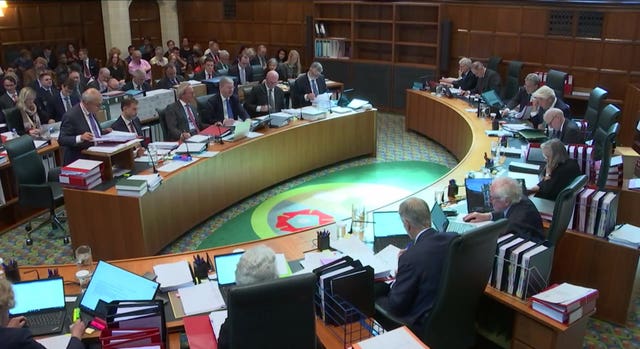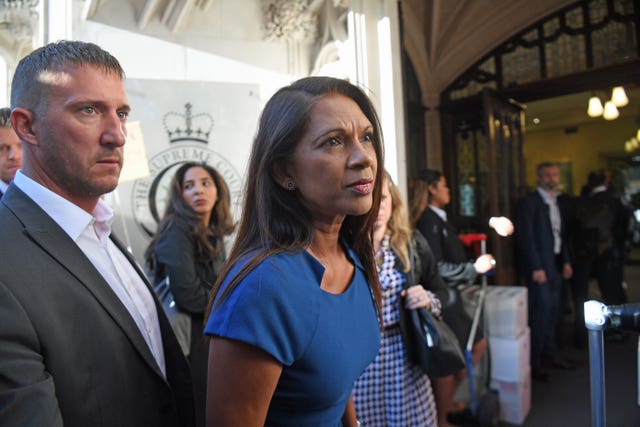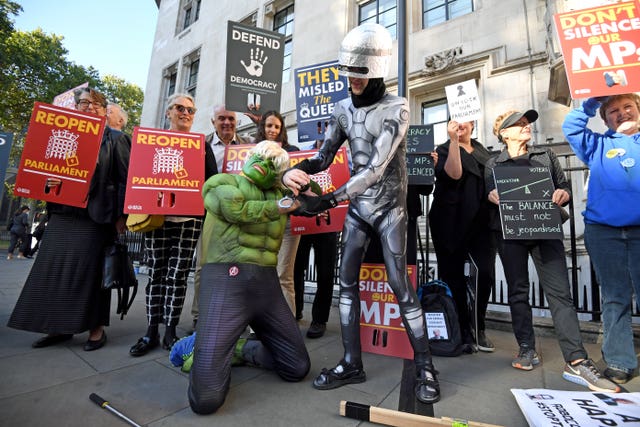Prime Minister’s motive for prorogation was to silence Parliament, court hears
Lawyers for Gina Miller said Boris Johnson’s advice to the Queen to suspend Parliament for five weeks was an ‘unlawful abuse of power’.

Prime Minister Boris Johnson’s motive for an “exceptionally long” prorogation was to “silence” Parliament, Supreme Court justices have heard.
Lawyers for Gina Miller, who is bringing a challenge over Mr Johnson’s advice to the Queen to suspend Parliament for five weeks, told the UK’s highest court that the Prime Minister’s decision was an “unlawful abuse of power”.
They also said he has failed to provide a witness statement or any other evidence to explain his decision to the court.
During a historic hearing in London on Tuesday, Mrs Miller’s barrister Lord Pannick QC said: “The exceptional length of the prorogation in this case is strong evidence that the Prime Minister’s motive was to silence Parliament for that period because he sees Parliament as an obstacle to the furtherance of his political aims.”
Lord Pannick added that it was a “remarkable feature” of the proceedings that Mr Johnson has not provided a statement explaining why he advised the Queen to suspend Parliament for the “exceptionally long period”.
Eleven justices are hearing appeals over three days arising out of two separate challenges brought in England and Scotland over the legality of the prorogation – which resulted in different outcomes.
The High Court in London dismissed Mrs Miller’s case, finding that the length of the prorogation was “purely political” and not a matter for the courts.

In Edinburgh, the Court of Session concluded Mr Johnson’s decision was unlawful because it was “motivated by the improper purpose” of frustrating Parliament.
Lord Pannick argued that the High Court “erred in law” in the case of Mrs Miller – who previously brought a successful legal challenge over the triggering of the Article 50 process to start the Brexit countdown.
He submitted that the Court of Session reached the “correct” conclusion as to Mr Johnson’s motive for proroguing Parliament.
The barrister told the court: “Their conclusions, we say, are supported by the Prime Minister’s own public statements as to his concerns as to what Parliament may do and the court … should be prepared in the circumstances to draw an inference from the absence of any evidence on the Government’s side by way of a witness statement.
“We submit that on all the material the court should conclude that, but for the Prime Minister’s wish to avoid Parliamentary control, he would not have recommended to Her Majesty a prorogation for a period of longer than five weeks, but he would have recommended a substantially shorter period … as had occurred on every occasion … in the last 40 years.”
Lord Pannick said the appeal raises “fundamental questions of constitutional law” and that no court had been asked to consider these issues because no Prime Minister “has abused his power in the manner in which we allege in at least the last 50 years”.
He accepted the Prime Minister does have the power to advise the Queen to prorogue Parliament, but argued the length of this suspension amounts to an abuse of power in the circumstances.
Lord Pannick added: “Parliament will be silenced for a substantial part of the period leading up to the deadline of October 31 when issues of grave national importance are being addressed (or not addressed) by the Government.”
He also said that, in the event the court finds the prorogation was unlawful, it will be for Parliament to decide what to do when it sits.
In his written submissions, he said: “Prorogation is the term which describes the end of a Parliamentary session brought about other than by the dissolution of Parliament leading to a general election.”
At the outset of the hearing, Supreme Court President Lady Hale emphasised that the case is only about whether the Prime Minister’s advice to the Queen was lawful.
She added: “It is important to emphasise that we are not concerned with the wider political issues which form the context for this legal issue.
“As will be apparent when we hear the legal arguments, the determination of this legal issue will not determine when and how the UK leaves the European Union.”

Mr Johnson advised the Queen on August 28 to prorogue Parliament for five weeks and it was suspended on September 9.
The Prime Minster says the five-week suspension is to allow the Government to set out a new legislative agenda in a Queen’s Speech when MPs return to Parliament on October 14.
But those challenging his decision argue that it is designed to prevent parliamentary scrutiny of the UK’s impending exit from the EU on October 31.
Mrs Miller’s High Court challenge was supported by former prime minister Sir John Major, shadow attorney general Baroness Chakrabarti and the Scottish and Welsh governments – who are all interveners in the Supreme Court case.
Victims’ campaigner Raymond McCord – who brought separate proceedings in Belfast, arguing that a no-deal Brexit would damage the Northern Ireland peace process – is also an intervener.
A cross-party group of around 75 MPs and peers, led by SNP MP Joanna Cherry QC, was responsible for the Scottish challenge and an appeal against the Court of Session’s decision is being brought by the Advocate General for Scotland, on behalf of the Westminster Government.

The Supreme Court justices are being asked to determine whether the Prime Minister’s advice to the Queen is “justiciable” – capable of challenge in the courts – and, if so, whether it was lawful.
The court will hear submissions from the parties – including the Prime Minister’s case that his advice on the suspension was lawful – and interveners from Tuesday to Thursday, but it is not clear when they will give a ruling.
A crowd of about 40 protesters, holding signs saying “Defend democracy”, “Reopen Parliament” and “They misled the Queen”, gathered outside the court ahead of the hearing.
Among them was a man dressed as Robocop and another calling himself the “Incredible Sulk” – wearing a blond wig with an Incredible Hulk costume – who was inspired by Mr Johnson comparing himself to the comic book character in a recent interview.
Supporters of Mrs Miller cheered and shouted “Bravo Gina Miller” as the businesswoman and campaigner arrived at court.
Ahead of the hearing, Mrs Miller described the prorogation decision as “a classic power-grab”, while Ms Cherry said she was “cautiously optimistic” the Supreme Court would uphold the Scottish ruling.





